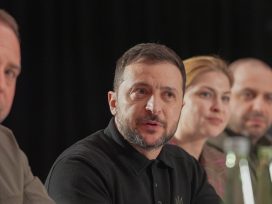
The ‘Trump–Putin deal’ again places Ukrainians in a subaltern role. The leaked contract with its fantasy $500 billion ‘payback’ has been compared to Versailles, but the US betrayal recalls nothing so much as Molotov–Ribbentrop.
What is left of the Maidan revolution three years after? Travelling to Kyiv for the Eurozine project “Beyond conflict stories: Revealing public debate in Ukraine”, Marina Lalovic from Radio3Mondo, Italy, spoke to journalists, representatives of civil society, and Italians living in Ukraine and working for the UN. She observed the energy of the city in a country where everything but the capital seems at war. Spoke to youngsters who claim that the new division is not between East and West, but between those who want to change things and those who continue to embrace the former traditional establishment.
Lalovic discussed the concept of patriotism and how to go about the reconstruction of Ukrainian national identity while searching for stability in everyday life. Being from Serbia herself, she looks for similarities and differences in the situation in the Balkans in the early 2000s.
The report was first broadcasted on 1 September 2016 on Radio3.rai.it and can be listened to in the Italian original here (starting min. 12’46”).
Published 21 September 2016
Original in English
First published by Radio3Mondo, 1 September 2016
Contributed by Marina Lalovic © Marina Lalovic / Radio3Mondo / Eurozine
PDF/PRINTSubscribe to know what’s worth thinking about.

The ‘Trump–Putin deal’ again places Ukrainians in a subaltern role. The leaked contract with its fantasy $500 billion ‘payback’ has been compared to Versailles, but the US betrayal recalls nothing so much as Molotov–Ribbentrop.

Ukraine faces its greatest diplomatic challenge yet, as the Trump administration succumbs to disinformation and blames them for the Russian aggression. How can they navigate the storm?